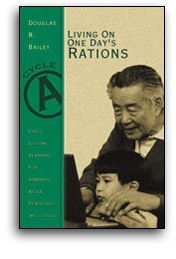SermonStudio
An Honest And Painful Wrestling Match
Sermon
LIVING ON ONE DAY'S RATIONS
First Lesson Sermons For Sundays After Pentecost
Jacob's wrestling match at Peniel is much different from the wrestling matches we see on television today. We become extremely skeptical whenever the wrestling match shows one wrestler flat on the mat allowing his opponent to jump and kick and put on a violent display of growling and groaning, a big theatrical temper tantrum which definitely delights the howling crowd watching this "one ring circus." But rather than yell out, "Fake! Fake!" it's much easier simply to grab the remote control and switch quickly to another channel.


